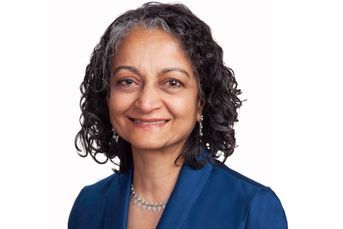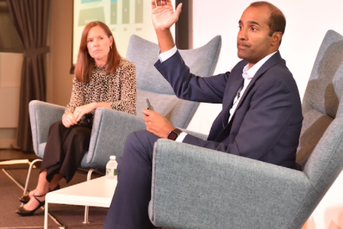Viral or vicious? Financial advice blows up on TikTok

In the past, advisers viewed social media as a marketing tool that targeted only millennial and Gen Z clients. That narrative has changed.
Financial advice goes viral thanks to social media
Imagine having less than a minute to dispense financial advice while standing in a room of thousands, or even millions, of potential clients. Now imagine doing that alone from the comfort of your home, with a smartphone and mobile app as the only tools needed.
That’s what financial advice is on TikTok, the short-form, video-sharing app. Type the hashtag personal finance — #personalfinance — into the TikTok app’s search bar and thousands of videos pop up that provide viewers with financial advice and explanations of financial terminology in the form of 60-second videos.
Financial influencers, some certified financial planners and some not, have leveraged society’s social media obsession to answer finance questions online ranging from “What’s a short squeeze?” to “How do I start saving for retirement?” in order to rack up followers and build a business.
These efforts are flourishing: TikTok videos tagged #personalfinance have garnered 3.5 billion views from the more than 1 billion monthly active users on TikTok, according to mobile data and analytics platform App Annie. By comparison, videos found under two other popular hashtags, #cookingtips or #healthtips, have 2.6 billion and 2.1 billion views, respectively.
While expanding financial advice to a wide range of young investors is a good thing, there is potential for bad results when mixing personal financial advice and TikTok, said Ritholtz Wealth Management CEO Josh Brown.
“Users should be aware that if you’re listening to people on social networks and not even bothering to Google them to see whether they have credentials and blindly doing what those people are saying, that responsibility is on the viewer just as much as it’s on the creator,” Brown said.
For example, some TikTok influencers create videos showing users how they invest in certain stocks to make money. One user, who goes by the TikTok username @Biaheza, shared a video with his 64,000 followers illustrating how he used the free trading app Robinhood to invest in “speculative” and “degenerate” trade options to make money, he said in the video. The user claims his strategy pushed his account value to $124,000.
While the financial advice may be risky, social media influencers with large followings can earn money through these platforms because advertisers will pay content creators to tout brand promotions and sponsorships to their thousands, or millions, of followers.
In July, TikTok introduced a $200 million TikTok Creator Fund after the platform’s popularity “propelled thousands of creators into brand partnerships, sponsorships, and representation deals,” according to TikTok’s announcement. Through the fund, TikTok users can apply to earn an income based on these criteria: Users must be 18 or older, have at least 10,000 followers, have at least 10,000 video views in 30 days, and consistently post original content in line with TikTok guidelines.
In the past, advisers largely viewed social media as a marketing tool that targeted only millennial and Gen Z clients. Clearly, that narrative has changed as the pandemic-fueled interest in finance has turned social media and financial advice into a full-blown business model.
INFLUENCER IMPACT
The focus on traditional ultra-high-net-worth clients typically steered advisory firms away from social media and younger investors. But millennials and Gen Z are expected to inherit $68 trillion, the greatest generational wealth transfer, over the coming years.
That wealth transfer represents an opportunity for advisory firms. What advisers should note is that these generations are going to keep getting their advice from online influencers, said Samantha Russell, chief evangelist at FMG Suite. Advisory firms should appoint a company spokesperson to serve as the face of their social media efforts to develop a brand that keeps up with financial influencers.
“If we look at why people choose to buy a pair of sweatpants or choose to decorate their home a certain way, it comes from social media influencers today,” Russell said. “It’s what we see on Instagram or TikTok that influences daily decisions.”
Younger generations are going to keep making decisions based on what they learn about finance from TikTok videos, she said. The way TikTok’s algorithm delivers content makes it easier to find random videos and introduces personal finance to a group of people who might not have been interested before.
One of the most popular providers of personal finance advice videos, with more than 1.5 million followers and 22.2 million likes on TikTok, is a former Merrill Lynch financial adviser turned social media influencer, Humphrey Yang, who’s known as @humphreytalks.
At 33, the San Francisco-based content creator snowballed on TikTok after he posted finance-focused videos on the platform. One video that went viral shows Yang scaling former Amazon CEO Jeff Bezos’ net worth with rice, with each grain representing $100,000.
via @HumphreyTalks
Yang, who ended his career as a professional financial adviser in 2012 to start his own e-commerce business, initially posted finance videos on YouTube, but they didn’t resonate with users, he said. Once he started posting shorter videos on TikTok last year that were more like comedy skits that explained financial terms, his following grew rapidly.
In 2019, “I noticed if I searched the personal finance hashtag on TikTok, nothing came up,” Yang said. “TikTok started becoming more popular at the time, but the mainstream hadn’t taken it on yet.”
He saw an opportunity to enter the space and use what he had learned as a financial professional to share personal finance advice — not tell young investors what stocks to trade. That strategy, in turn, has created Yang’s self-made business.
“I’ve always watched YouTube, I also like some of the personal finance YouTubers on there, and so that was more of the inspiration,” Yang said. “Then I just decided at the end of 2019, to make a video a day in 2020. My first goal was 30 days. And after I hit 30 days, I had 100,000 followers.”
Today, Yang makes personal finance videos almost full-time. The most popular videos usually feature Yang having a somewhat humorous conversation with himself acting as a personified version of the financial concept he’s explaining.
The whole key to social media is to get people’s attention and teach them something worthwhile, said Brown of Ritholtz Wealth Management. He has 8,342 followers on TikTok with more than 44,000 likes on his videos. Brown also has more than a million followers on Twitter but said he doesn’t use that platform as much as he uses TikTok and YouTube.
“You have to package that into something that’s either very cool, very sexy or very funny — that’s all anybody wants,” he said. “When [a user] stares into their nightmare rectangle iPhone, all they want is to see something that excites them or makes them laugh, anything else is a total waste of time.”
What both Yang and Brown have done is take financial planning concepts and packaged them in a way that people will watch. “If you can figure that out, you can build an audience no matter what platform you’re on,” Brown said. “Just don’t look thirsty, that’s never a good look.”
via @downtownjbrown
For Brown, whose handle is @downtownjbrown, TikTok is all about comedy since the platform doesn’t exactly ring in the kind of clients his firm targets. “It’s liberating because nobody cares who I am on TikTok,” he said. “It’s a totally new audience and I have no reason to give financial advice on a social network … I get paid for giving financial advice in real life.”
Instead of telling people how to invest their money, what Brown does on TikTok is give people context about what’s happening in the markets.
One U.K.-based financial planner, Amyr Rocha Lima, a partner at Holland Hahn & Wills, a financial planning and wealth management firm, is looking to become the certified financial planner on TikTok who posts professional content that resonates.
Lima started posting on TikTok Jan. 1 and has posted daily since. In just one month, he’s brought in more than 2,000 followers to his TikTok account.
While Lima has yet to win any new clients from his TikTok efforts, he sees the platform as a way to build his trust and credibility as his career unfolds, he said.
@arochalima
“I’m in my mid-30s, so I think of it as a marathon, not a sprint,” he wrote in an email. “It’s clear that personal finance is of interest to all ages, but it’s about contextualising the message to different audiences. TikTok fills the gap for Gen Z, which in the long run is where my next generation of clients will come from.”
LIKE THE WILD WEST
Social media is massive, and its dark side is the thousands of TikTok and Instagram accounts that are touting bad or even predatory financial advice.
Atlanta-based financial planner Jacqueline Schadeck (@jacquelineplans) has a following of more than 7,400 on Instagram. She had her Instagram account cloned, with the hacker stealing her photos and creating a fake account under her name to try to solicit money from her followers, also known as her client base.
Schadeck was able to report the clone to Instagram and have it shut down. But these types of predatory and sketchy accounts exist and need to be combatted, Russell said.
“If I had an adviser right now say to me, ‘I’d be interested in a TikTok account doing nothing but dispelling all the terrible financial rumors and claims out there,’ that’d be an amazing idea,” Russell said. “I’m sure that would be an account people would start seeing, tagging and following because there’s such an opportunity when social media is like the Wild West.”
Lima said that was largely his intent in starting his TikTok account. “As a CFP professional, I feel a sense of duty to share with the world a message that will enable people to pursue a successful financial journey,” he said. “In other words, in a world full of noise, we need to be the signal.”
Orlando, Florida-based adviser Angela Moore — whose business Instagram, @modernmoneyadvisor, has 6,400 followers — believes the advisory industry needs to do more to get the message out there that young adults should be listening to professional advisers and not celebrity financial gurus.
Yang has a massive following and a CFP background, but he personally doesn’t feel the need to put “former CFP or FA” on his TikTok profile since his license has expired.
“I do take that fiduciary responsibility with my content,” he said. “I’m not trying to pump and dump stocks for GameStop. I might make a video on what is the short squeeze so my audience understands the situation better, but by no means do I give stock advice.”
There’s a lot at stake when virtually anyone on TikTok can share financial advice and go from having a handful of followers to 50,000 followers overnight, Yang said. “If a creator is telling their followers to buy call options at GameStop and that reaches the wrong person, and maybe that person takes a risk and overextended themselves where they lose money, that’s where bad financial advice comes in.”
If social media’s influence over the political environment wasn’t enough to convince the advisory industry of the power of social media, the surge in the stock of GameStop Corp. cemented how prominent these platforms can be in market moves, said Kelly Waltrich, chief marketing officer of Orion Advisor Solutions.
“What I’m OK with is people who want to drive others to think more thoughtfully about their finances,” Waltrich said. “But there’s a fine line between getting people aware and thoughtful, and actually giving advice. That’s a line users have to look for because the two are very different.”
[More: Instagram reigns — for now]
Learn more about reprints and licensing for this article.








